
John Knox was a Scottish minister, Reformed theologian, and writer who was a leader of the country's Reformation. He was the founder of the Presbyterian Church of Scotland.
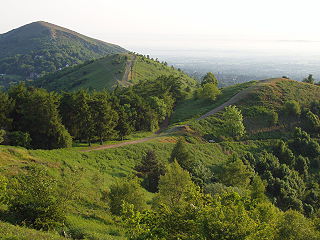
Ley lines are straight alignments drawn between various historic structures, prehistoric sites and prominent landmarks. The idea was developed in early 20th-century Europe, with ley line believers arguing that these alignments were recognised by ancient societies that deliberately erected structures along them. Since the 1960s, members of the Earth Mysteries movement and other esoteric traditions have commonly believed that such ley lines demarcate "earth energies" and serve as guides for alien spacecraft. Archaeologists and scientists regard ley lines as an example of pseudoarchaeology and pseudoscience.

Jamie Macgregor Reid was an English visual artist. His best known works include the record cover for the Sex Pistols single "God Save the Queen", which was lauded as "the single most iconic image of the punk era."
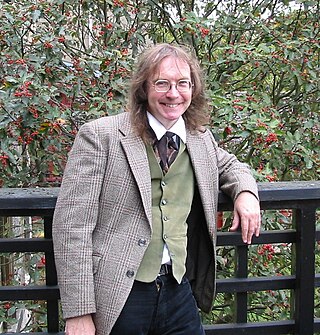
Ronald Edmund Hutton is an English historian who specialises in early modern Britain, British folklore, pre-Christian religion and Contemporary Paganism. He is a professor at the University of Bristol, has written 14 books and has appeared on British television and radio. He held a fellowship at Magdalen College, Oxford, and is a Commissioner of English Heritage.
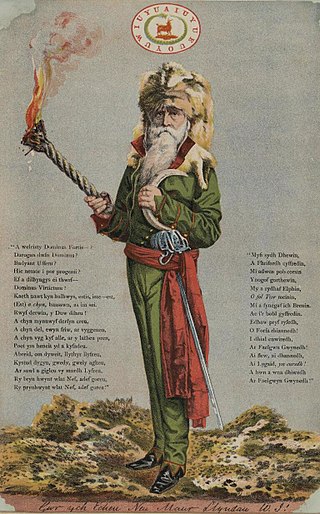
William Price was a Welsh physician and political activist best known for his support of Welsh nationalism, Chartism and involvement with the Neo-Druidic religious movement. Historians have characterised Price as one of the most significant figures in Wales in the Victorian era.
The National Transport Workers' Federation (NTWF) was an association of British trade unions. It was formed in 1910 to co-ordinate the activities of various organisations catering for dockers, seamen, tramwaymen and road transport workers.

The Order of Bards, Ovates & Druids or OBOD is a Neo-Druidic organisation based in England, but based in part on the Welsh Gorsedd of Bards. It has grown to become a dynamic druid organisation, with members in all parts of the world.
Emma Restall Orr is a British animist, philosopher, poet, environmentalist, and author.

Godfrey Higgins was an English magistrate and landowner, a prominent advocate for social reform, historian, and antiquarian. He wrote concerning ancient myths. His book Anacalypsis, was published posthumously, in which he asserts a commonality among various religious myths, which he traces back to the supposed lost religion of Atlantis. He has been termed a "political radical, reforming county magistrate and idiosyncratic historian of religions".
The Church of the Universal Bond, a religious group founded in Britain in the early twentieth century by George Watson MacGregor Reid, promoted socialist revolution, anti-imperialism and sun worship.

Ancient Celtic religion, commonly known as Celtic paganism, was the religion of the ancient Celtic peoples of Europe. Because there are no extant native records of their beliefs, evidence about their religion is gleaned from archaeology, Greco-Roman accounts, and literature from the early Christian period. Celtic paganism was one of a larger group of polytheistic Indo-European religions of Iron Age Europe.

The Reformed Druids of North America (RDNA) is an American Neo-Druidic organization. It was formed in 1963 at Carleton College, Northfield, Minnesota as a humorous protest against the college's required attendance of religious services. This original congregation is called the Carleton Grove, sometimes the Mother Grove. There are over 40 groves and proto-groves of the RDNA throughout the United States and Canada.
Philip Carr-Gomm is an author in the fields of psychology and Druidry, a psychologist, and one of the leaders and former Chosen Chief of The Order of Bards, Ovates and Druids.
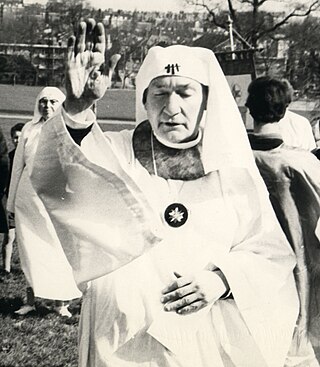
Philip Peter Ross Nichols was a Cambridge academic and published poet, artist and historian, who founded the Order of Bards, Ovates and Druids in 1964. He wrote prolifically on the subjects of Druidism and Celtic mythology.
The Druid Order is a contemporary druidry fraternal order, founded in 1909 by George Watson MacGregor Reid in the United Kingdom. At various times it has also been known as The Ancient Druid Order, An Druidh Uileach Braithreachas, and The British Circle of the Universal Bond. Initiated members are called companions.
Philip Shallcrass, often known by his Druid name, Greywolf, is Chief of the British Druid Order. He is an English artist, writer, poet, musician and singer-songwriter who pioneered a "shamanic" Druidism.
Donald Gregory (1803–1836) was a Scottish historian and antiquarian, who published a valuable history of the Western Highlands and Isles of Scotland.
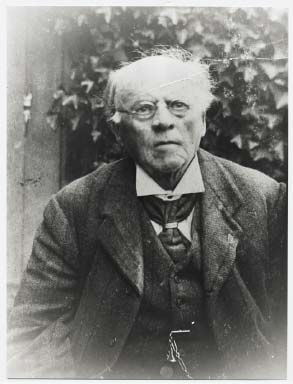
Owen Morgan, also known by his bardic name Morien was a Welsh journalist, and a writer of books on the subject of neo-druidism. Morgan developed the mythology of both Iolo Morganwg and Myfyr Morganwg, and his druidical writing is not taken seriously by historians.

Druidry, sometimes termed Druidism, is a modern spiritual or religious movement that promotes the cultivation of honorable relationships with the physical landscapes, flora, fauna, and diverse peoples of the world, as well as with nature deities, and spirits of nature and place. Theological beliefs among modern Druids are diverse; however, all modern Druids venerate the divine essence of nature.
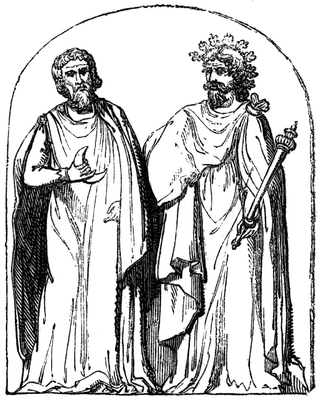
A druid was a member of the high-ranking priestly class in ancient Celtic cultures. Druids were religious leaders as well as legal authorities, adjudicators, lorekeepers, medical professionals and political advisors. Druids left no written accounts. While they were reported to have been literate, they are believed to have been prevented by doctrine from recording their knowledge in written form. Their beliefs and practices are attested in some detail by their contemporaries from other cultures, such as the Romans and the Greeks.













